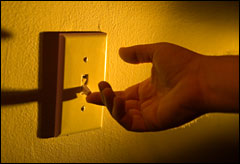Dear Umbra,
I’m always hollering at my friends and colleagues to turn off the lights when they leave the room. Considering my business is green-related, it blows me away that my staff can’t seem to get a handle on flicking the switch. But it’s probably mostly a matter of them not really knowing why it’s important. So what’s the elevator pitch — you know, a good sentence or two? I know we’re unnecessarily consuming electricity, and the production of said electricity is dirty, but is there more to it that’ll get under their skin and make them inspired to get mindful?
Waylon
Boulder, Colo.
Dearest Waylon,
You holler at them? How mindful is that? Let’s assume you are simply being humorous, and I will try to be likewise with my little list of tips. But first I have a hair to split: “elevator pitches.” Who coined this phrase? Who ever talks out loud in an elevator, much less says apropos of nothing, “Leaving lights on wastes electricity, everyone”? Can you imagine? Then you’d have to ride the elevator day after day with people who spend the ride silently remembering you as the electricity nut job.

Horror flick.
Photo: iStockphoto
Oh, I’m alone in the basement all day and have a lot of this kind of stuff I need to get off my chest. On to the lights.
You can do a few things to reduce the inevitable wasted electricity without ever speaking to your colleagues. Compact fluorescents will help, of course, but also installing a few timed light switches in appropriate areas such as the bathroom or kitchen or storage closet so that no one is able to leave the lights on for more than, say, half an hour. Then lights will turn off even if you are on vacation and unable to holler — the lights themselves become mindful. Ohm.
As far as motivating your colleagues directly, I think a first step is having electrical usage numbers and financial costs at your fingertips. It would be nice to set a usage-reduction goal, or at least to keep track of any reduction in electrical use, so that after the hollering can come some praise.
Your city of Boulder has an amazing new Climate Action Plan Tax that will add to the monthly electricity bill, so any conservation will cut down on both the tax and the bill. Another financial motivator could be to give someone a nickel every time you see them turn off a light. A candy bar might be equally effective as small change.
Speaking of small change, I have to confess: I am going to pass the buck on the “elevator pitch.” And I know how you can too. You don’t get out of doing the preliminary work, though (and I obviously don’t get out of writing this column).
Research your typical electric bill, the kilowatt-hours the business is using, the fuel mix generating the electricity, the carbon emissions of the fuel mix. Then assemble these into a few short sentences. In an email — or even better, in a few moments at a staff meeting — tell everyone that you know you’ve been obnoxious about turning off the lights, you’re sorry, but it is important to you and to the business and the environment. You are motivated by [insert your persuasive facts here]. In fact, you are so motivated, you are putting your money where your mouth is. That’s when you will lay out the rules for the contest.
Yes, the contest! Explain that you want to have a contest for the best way to encourage people to turn off lights. Everyone can put together two or three sentences of a pitch and send them to you by a certain date. You collate the sentences and send them back out, everyone ranks their top two, and you calculate the winner using instant runoff voting, and the winner gets a prize. You determine the prize, of course. Something everyone wants. A gift certificate, a mindfulness cushion, a pole for reaching the light switch without getting up, $40 cash, something enticing.
When you’re all done, send the pitch along to us here at Grist, because we are interested in what happens to all this advice I send off into the ether.
Flippily,
Umbra

